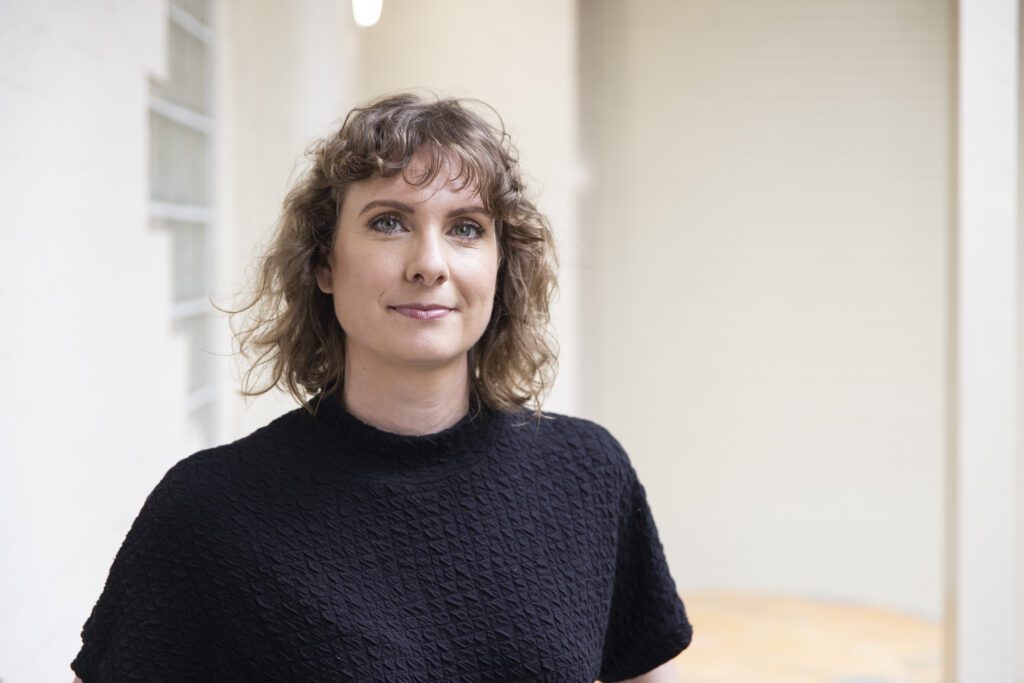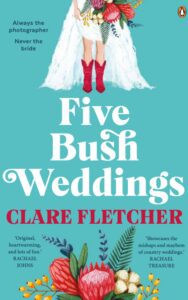There’s an iconic scene in Clare Fletcher’s debut novel Five Bush Weddings involving a steamy kiss and a thud as a meat pie drops to the ground, all but forgotten in the heat of the moment.
This hot/sweet/funny scene characterises Clare’s book, a rural rom-com that shakes off stereotypes to reveal a glimpse of modern life in the bush, with all its beauty, hardship and humour. It follows Stevie, a talented wedding photographer who captures a steady stream of rural romances through her lens but can’t seem to frame up her own happily ever after. Stevie is a hot mess and a hot item on the local gossip’s Bush Telegraph – and then her ex’s best friend, Johnno, reappears, reigniting old memories and confused feelings.
I loved this book, not just because of Clare’s beautiful writing, but the way she threads real rural stories – the connection of country communities, the struggles farming families face trying to forge ahead in an ever-changing landscape – with the issues many women in their thirties grapple with, no matter where they’re from. It’s set between Brisbane and country Queensland, and Clare draws on her own background growing up in a regional town to fill the scenes and characters with authenticity.
Clare is also a journalist so I was keen to hear if her day job helped her get the words for her first novel down on paper (yes and no!). Here, she shares her writing journey, her experience of being edited (not nearly as brutal as she expected), why playing team sport as an adult is a little like writing a book, and what readers can expect from her next…
Congrats on the release of your first novel! I loved Five Bush Weddings and found it got me thinking about my own life journey, as Stevie grapples with her life decisions, a bad breakup and the pressure to settle down. What sparked the idea for the book?
I decided quite consciously to try to write a book, which had been a lifelong dream I’d spent three decades doing nothing about. When I decided to try writing a romance, thinking it would be quite formulaic, I wanted to explore that messy period in your early thirties when it feels like there are lots of conflicting expectations for women – have a brilliant career, get married to the perfect man, have babies, own a house, travel the world, be creatively and spiritually fulfilled. Very few people can knock all those off and if you haven’t done any of them, cue the soul-searching! And so many of those things are down to chance – I think we all have a beloved friend who just hasn’t met the right partner, through no fault of their own, but judgemental people can treat them like it’s a shortcoming or a character flaw that they’re single. Anyway, I liked the idea of a heroine who’s pretty great at her job but a bit aimless and hopeless at life, finding joy and purpose without needing a man to ‘fix’ her. A wedding photographer seemed like a great protagonist to explore different types of love as well as some fun parties!
I love the way you portray rural Australia in the story. What was your aim in writing about the country? Were you hoping to give people a more informed glimpse?
Growing up in a small town in regional Queensland is something I’m so proud of and grateful for, and this story is one big love letter to it. I’m a townie so I don’t have lived experience of working the land, but I’ve worked in small town pubs and restaurants and done peripheral farm jobs like cotton chipping, bug checking and grape picking! It feels like there’s a lot of rural-set crime fiction in Australia at the moment, so I wanted to try telling a more joyful story about country communities. And a lot of rural romance is understandably set in more idyllic locations – lush high country, wineries or vast stations – so I thought it would be fun to use the more prosaic settings of the places of my youth. I think there’s a real resilience and camaraderie, and a very unique sense of humour, that comes with the harsh unpredictability of living on the land.
How much of the story is based on your own experiences of living in the country and overseas?
All of Stevie’s terrible habits, many of her experiences at parties, and her memories of New York, are mine!
Is it difficult to mine your own life experiences for art?
Actually, I think it can be too easy! Often I’d use a memory or an experience as a starting point to imagine a scene, and a lot of those very specific details remain in the final book. My sister told me the other day that everyone at home is speculating about who the Bush Telegraph is based on – that’s the trouble with having recognisable details, sometimes people forget the characters are fictional (I swear)!
Tell me about your journey to becoming an author. When did you start writing fiction and why?
I’d always loved creative writing as a kid but it never felt like a realistic career path, so I didn’t dedicate much time to it after university. I think I had grown a bit depressed that I was ignoring this thing I’d always wanted to do, so I decided I had to give it a proper try. Weirdly, it was starting to play team sport in my mid-30s that got the ball rolling – it was a great reminder that the world won’t end if you’re bad at something, it can still be fun even if you suck, and that you can see improvement when you keep trying. Even getting into running was a great lesson in the way small, regular increments can add up to a big achievement. So I signed up to do the Year of the Novel course at Writing NSW in 2019. I don’t think anyone needs to study writing to start a book, but I knew I needed external accountability and structure. I didn’t finish the book in that year but it was exactly what I needed, and also helped me connect with fellow writers as well as a teacher who would go on to become my mentor.
“It was starting to play team sport in my mid-30s that got the ball rolling – it was a great reminder that the world won’t end if you’re bad at something, it can still be fun even if you suck, and that you can see improvement when you keep trying.”
What about the nuts and bolts of writing a novel. Did your background as a journalist help?
It’s just chipping away over time. Journalism has made me very lazy without a pressing deadline, so it was a real mind-shift to keep working on this manuscript no one might ever read. There were weeks and months when I didn’t write, which can be something we gloss over when we’re telling the neat story of how a book gets written, but at a certain point you find you’ve invested so much in the characters that you need to finish it. Journalistic training has given me an appreciation for clarity in writing, some skills in observation, and maybe all those hours of transcribing interviews helped with writing dialogue!
How long did it take to write Five Bush Weddings?
It was a bit less than 18 months to finish the first draft. I was working full time, and pregnant for the last stretch! That ended up being the deadline I needed – imminent labour. While I was on parental leave, I worked with a mentor to refine the manuscript to submit to agents. Once I found my agent, it took a few months to lock in a publisher; and once the contract was signed it was less than a year to publication. So in all it was about three-and-a-half years, from starting to publication.
How did you find the editing process? Scary, empowering, fun?
This is where I think I was lucky to have worked in journalistic editorial, because I knew what to expect somewhat. I was absolutely packing it waiting for my structural edit, but book editors are much more gentle with you than a newspaper or magazine editor! I couldn’t believe the way my copy editor explained every suggested change, and offered lots of kind compliments to offset the constructive criticism (this is professionally known as the ‘shit sandwich’ or ‘compliment lasagne’). At the end of the day, editing is about making a piece of writing the best it can be, and making sure nothing stands in the reader’s way of enjoying the story. Suggested changes aren’t personal, you’re on the same team, and as the author you always have the right to accept or reject a change
“At the end of the day, editing is about making a piece of writing the best it can be, and making sure nothing stands in the reader’s way of enjoying the story.”
Can you share any insight into lessons you learned from the experience?
My publisher (Nikki Christer) did my structural edit and that was a great learning experience. When she suggested my main character was a bit unlikeable, at first I freaked out, thinking it would be a huge job to rework her. But Nikki helped me see that a few simple scenes building Stevie’s relationship with her mum and her best friend could do a lot of heavy lifting to show why these people stick with Stevie even when she’s not making great decisions. Nikki also told me to go back and read Bridget Jones’ Diary and I think that can be really helpful, revisiting a touchstone book when you’re struggling with something.
What writing/editing rules do you love to break?
‘Show don’t tell’ is good advice a lot of the time, but sometimes we go too far in that direction when a bit of exposition can be much more efficient! I just bloody love words so I probably pepper in way too many adverbs (Kurt Vonnegut would never) and description… but that stuff is so pleasurable for me to write, I hope it’s enjoyable for readers, too.
What advice would you give other aspiring authors?
Don’t wait for the perfect conditions, the perfect idea or some arbitrary skill level to get started. Once you’re writing you’ll learn so much as you go. I think women in particular are often waiting for permission or over-qualification to start writing and sometimes you just have to ask yourself – would a mediocre white man hesitate in this situation?
What’s next for you? What are you working on now?
I am getting close to my submission deadline for the second book in my contract. Obviously it’s an immense privilege to be contracted but it’s also done my head in a bit – working with very different expectations to the first time around. This new story will be in the same universe as Five Bush Weddings, with different main characters. There’s a historical timeline thread as well as the present day. Deb balls, beauty pageants, a collection of vintage dresses and women’s rugby – a weird cocktail!
Pick up a copy of Five Bush Weddings here and find out more about Clare (and sign up for her excellent newsletter) here.


